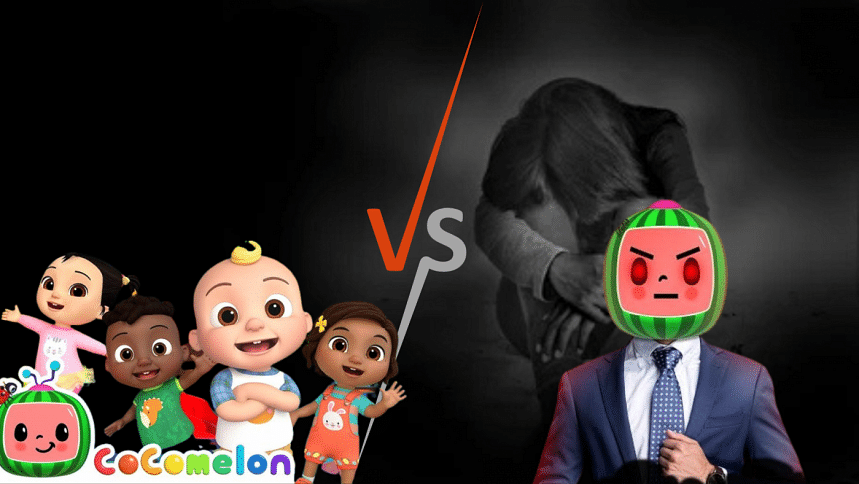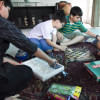Is CocoMelon bad for your children?

Cute characters, lively hues, and catchy music — all combine to create CoComelon. Both parents and toddlers find it difficult to resist. It might seem like a lifesaver for many of us in Dhaka who are trying to balance job, family, and everything in between. It provides us with a few valuable minutes to relax, complete some work, and simply take a little break. However, a growing number of parents are sharing personal accounts lately which raises the question: Is CoComelon causing more harm than good?
For Rajib, a businessman managing his ventures, the show initially felt like a gift.
"It was perfect! My son would sit there, completely focused, and I could finally answer my calls without interruptions."
However, Rajib soon began noticing some changes. "It was not just that he wanted to watch it all the time; it was that when we tried to switch it off, he'd have these massive tantrums. I felt like I was losing control over the situation."
Abdul Hamid, a noted psychotherapist, says, "We, as adults, are addicted to the online world thanks to constant scrolling and endless barrages of content, even though it's a one-way communication. We compensate our energy and effort according to our environment."
He continues, "Now think about a child or a toddler for whom this is the only sort of activity throughout the day. Being constantly exposed to such one-way communicative content, they automatically discard or undermine using their other senses. They do not see the need to explore, which is crucial for a young mind."
A world of overstimulation
At its heart, CoComelon is designed to grab and hold a child's attention. The quick scene changes, bright colours, and non-stop music do precisely that. However, experts claim that this continual barrage of sensory information may overwhelm a child's growing brain. Infants perceive the world via their senses and when they are constantly stimulated, they are unable to stop thinking or reflecting on what they are experiencing.
Somaila, a school teacher and mother of two, has experienced this first-hand. "After a few episodes, it was like my son would zone out. He would not respond if I called him, and if we turned off the TV, he'd have a meltdown."
For parents like Somaila, it's the aftermath that's the hardest to handle. "I wanted to give him a little break with the show, but instead, I ended up with a child who was irritable and frustrated when it was over."
Speech delays: A growing concern
Another troubling issue that has emerged is the possible link between CoComelon and speech delays. Experts say that shows like this, which engage children passively, reduce the need for them to communicate. Instead of interacting with people, children are glued to a screen, absorbing sounds and visuals without responding verbally.
"I didn't even notice it at first," admits Orthi, a mother of two. "My youngest was watching CoComelon almost every day, and I just thought he was taking a bit longer with his speech. But after I cut it out, his speech picked up almost instantly. He started saying simple words like 'mama' and 'dada' that he hadn't said before."
This experience is not unique; many parents have noticed significant improvements in their child's speech once they reduced screen time.

Tantrums and dependency
The show's fast pace and continuous flow of bright, cheerful content can make the real world seem dull in comparison. For children accustomed to the non-stop stimulation of CoComelon, everyday life might feel too slow. This can lead to frustration, and, in many cases, tantrums.
Shariar, a service holder, has been grappling with this very issue. "At first, CoComelon was great—it kept my son happy and gave me some time to relax after work. But then it turned into a fight. He'd scream and refuse to eat anything without his daily dose and nothing else would keep him calm."
His experience is echoed by other parents who describe their children's attachment to the show as almost addictive. "It was the only thing that would calm him down after a busy day, but I could tell that the moment we stopped it, the tantrums would start. It felt like he was becoming dependent on it," Shariar explained.
So, what can parents do?
While it might feel tempting to keep CoComelon on as a way to entertain children, the key lies in moderation. Rajib, who initially relied on the show to keep his son occupied, has since cut back on screen time.
"We're limiting it now. I let him watch one episode a day, but I try to keep him engaged with other things—books, puzzles, or just playing together. It's been a bit of a transition, but it's worth it," he said
Here's what concerned parents recommend:
Limit screen time: Keeping the show to just one or two episodes a day can help reduce overstimulation and encourage more balanced activities.
Choose slower-paced content: Shows like Bluey or Daniel Tiger provide more meaningful engagement without the rapid pacing.
Encourage interactive games: Instead of relying on passive entertainment, try engaging your child in more hands-on activities. In Dhaka, this could be as simple as storytelling, drawing, or even playing with children-friendly moulding clay.
Watch together: Co-viewing can help transform screen time into a more interactive experience. Talk to your child about what's happening on screen, ask questions, and get them to respond.
For Orthi, the difference was night and day. "Now, instead of CoComelon on loop, we're doing more reading, and my son is talking to me. I didn't realise how much the show had affected him until we made the change."
In the modern world of hectic schedules and juggling work and family obligations, it's simple to resort to quick solutions like CoComelon to keep kids occupied. However, as parents in Dhaka and elsewhere discover, it's critical to consider the amount of screen time our children spend and the potential effects it may have on their development.
Making minor adjustments may have a significant impact on ensuring that our children have the resources they require to succeed, whether that means restricting their exposure, selecting slower-paced media, or just being more present when they use screens. Nobody wants a show to take the place of their child's voice, after all.

 For all latest news, follow The Daily Star's Google News channel.
For all latest news, follow The Daily Star's Google News channel. 













Comments